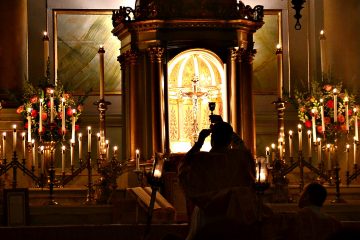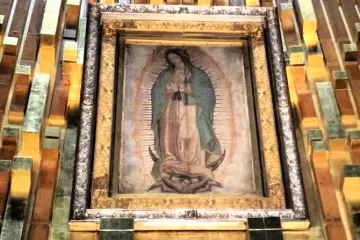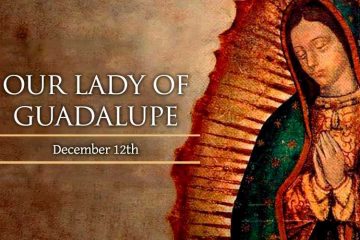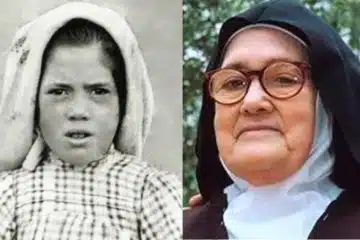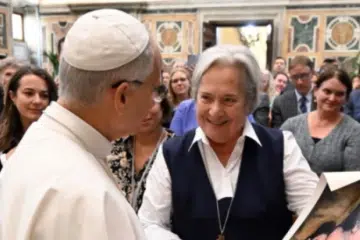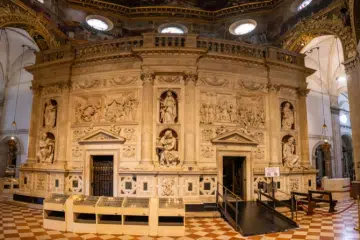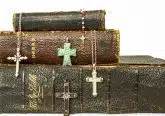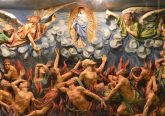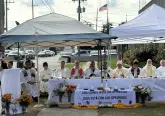Communion and Intercommunion
Why can’t non-Catholics receive Holy Communion in Catholic churches?
The Catholic Church ordinarily does not admit non-Catholics to Holy Communion. This practice can be especially difficult for those with close family members who are non-Catholic, especially spouses, children or siblings. This limitation on who is invited to receive Communion does not indicate that only Catholics are sufficiently holy to receive, but rather indicates that to receive Communion believers should share a common understanding of its significance and live accordingly.
COMMON UNDERSTANDING
For Catholics, the Eucharist is the “source and summit” of the Christian life. Jesus is present in the Eucharist, not only symbolically and spiritually but really and truly; the consecrated bread and wine become the Body and Blood of Christ during the Mass. This shared belief binds the faithful together, and their reception of Holy Communion shows the faithful’s unity in Christ. This belief is central to Catholic doctrine and differs from many other Christian understandings; many Protestants believe that the Eucharist is symbolic or communicates only a spiritual reality.
LIMITATIONS ON RECEPTION
The early Christians recognized that not all people could be invited to receive Communion. St. Paul speaks of the danger of eating the bread and drinking from the cup “in an unworthy matter.” He explains that before receiving, a person should “examine” oneself (1 Cor. 11:27-28).
Other early Christian writings, such as the Didache and St. Justin Martyr’s First Apology, assert that Holy Communion can only be offered to the baptized, those who assent to the Church’s teachings and those who live in conformity with the Gospel. Such restrictions were not intended to offend but to remind faithful that the Eucharist is the Body and Blood of Jesus and should only be worthily received.
NON-CATHOLIC COMMUNITIES
For Catholics, the reception of Holy Communion not only manifests personal communion with Jesus but also implies full communion with the Church. Since non-Catholic Christians do not share the same understanding of the Eucharist as Catholics, their reception of Communion at Mass would not be synonymous with their beliefs; likewise, a Catholic receiving Communion in a non-Catholic church is not synonymous with accepting their beliefs. As the Catechism states, non- Catholic Christian churches “have not preserved the proper reality of the Eucharistic mystery in its fullness,” which is why “intercommunion … is not possible” (CCC 1400).
Though unable to share the Eucharist, the Church approves of other expressions of shared faith. It recognizes that non- Catholic Christians are incorporated into Christ by Baptism and acknowledges that many elements of sanctification and truth are found in non-Catholic communities, even while the fullness of truth subsists in the Catholic Church. Through their prayer and worship, these other congregations also commemorate the Lord’s death and resurrection.
EXCEPTIONS FOR NON-CATHOLICS
The Church encourages ecumenical efforts with other Christian traditions. However, due to differences in doctrine and theological understanding, sharing the Eucharist with non- Catholics is generally permitted only in specific, rare situations. In case of danger of death, it may be possible for a Catholic minister to offer the Eucharist to a non-Catholic provided that the person cannot approach their own minister, freely requests the Eucharist, shares Catholic belief in the Eucharist and is properly disposed to receive it (Code of Canon Law 844, §4).
SACRAMENT OF UNITY AND CHARITY
The Eucharist is called the sacrament of unity and charity. For this reason, we look forward to a diminishment of divisions that separate Christians, impede the reception of Holy Communion and harm the unity that Christ intended. As St. Paul says, “The bread that we break, is it not a participation in the body of Christ? Because the loaf of bread is one, we, though many, are one body, for we all partake of the one loaf” (1 Cor. 10:16-17).
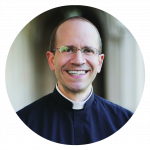 Father David Endres is professor of Church history and historical theology at Mount St. Mary’s Seminary & School of Theology.
Father David Endres is professor of Church history and historical theology at Mount St. Mary’s Seminary & School of Theology.
This article appeared in the June 2024 edition of The Catholic Telegraph Magazine. For your complimentary subscription, click here.



